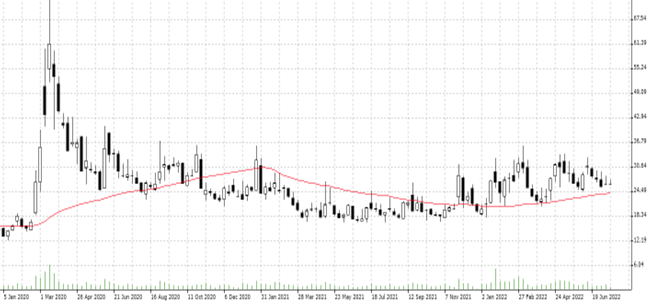

22.07.2022 – A potential disaster for the stock market world is smoldering in China. If the real estate market collapses there and rows of banks topple over, the crisis will virtually eat its way through the globe to us. Unfortunately, there have been some dangerous signals from the Middle Kingdom recently, which have hardly found any echo in the mainstream media so far.
Hard to believe, but true: the world’s stock markets are facing enormous danger and no one is noticing. If you follow our comments below, then it’s time to stock up with some long positions on the fear indicator VIX to be on the safe side, which you can see here in the weekly chart with the 50 moving average. If the crisis escalates, it will easily reach the old highs from the Corona crisis.

Source: Bernstein Bank GmbH
De facto, the Chinese real estate market is like a nuclear reactor about to explode. We chose this image based on the 1979 U.S. disaster movie “The China Syndrome.” The strip anticipated the accident in Harrisburg. At the time, experts assumed that a meltdown would actually eat into the earth’s mantle – unstoppable, all the way to China on the other side of the globe.
Craftsmen fail to service loans
Now it could go in the opposite direction. As Bloomberg reports, citing “Caixin,” hundreds of suppliers to Chinese project developers are currently refusing to service their loans. They pointed out that large developers such as China Evergrande still owe them money. Thus, the strike by real estate buyers has eaten into the system.
Mortgage strike
Earlier, the financial blog ZeroHedge reported that millions of angry property buyers are refusing to service their loans – though legally they are in the right because most of the apartments in the huge prefabricated buildings have not been completed. It was common practice in China for years to sell apartments before they were built. That practice has turned around with the collapse of Evergrande. Apparently, the mortgage strike has already spread to about 300 projects in 90 cities; there had been demonstrations in about 50 cities recently. Presumably, millions of loans are currently at risk. According to a statement from the Chinese banks, only mortgages amounting to 2.1 billion yuan or $312 million are currently at risk. GF Securities Co., however, sees ten times that amount in the fire, at 2 trillion yuan. All told, Chinese banks hold mortgages worth 38 trillion yuan.
The world’s largest asset class
What can’t leave us cold: According to Goldman Sachs, Chinese real estate is the largest asset class in the world, with an estimated $62 trillion. Craig Singleton of the analytics firm Foundation for Def
Important Notes on This Publication:
The content of this publication is for general information purposes only. In this context, it is neither an individual investment recommendation or advice nor an offer to purchase or sell securities or other financial products. The content in question and all the information contained therein do not in any way replace individual investor- or investment-oriented advice. No reliable forecast or indication for the future is possible with respect to any presentation or information on the present or past performance of the relevant underlying assets. All information and data presented in this publication are based on reliable sources. However, Bernstein Bank does not guarantee that the information and data contained in this publication is up-to-date, correct and complete. Securities traded on the financial markets are subject to price fluctuations. A contract for difference (CFD) is also a financial instrument with leverage effect. Against this backdrop, CFD trading involves a high risk up to the point of total loss and may not be suitable for all investors. Therefore, make sure that you have fully understood all the correlating risks. If necessary, ask for independent advice. CFDs are complex instruments and are associated with the high risk of losing money quickly because of the leverage effect. 68% of retail investor accounts lose money trading CFD with this provider. You should consider whether you understand how CFD work and whether you can afford to take the high risk of losing your money.7
